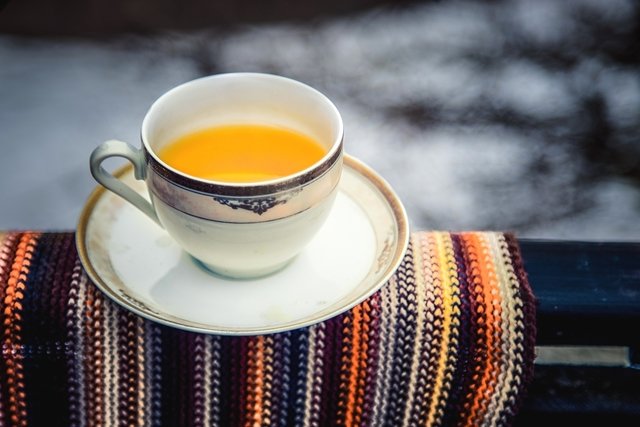The use of teas during pregnancy must be done with great care, as there are plants that can affect the pregnant woman’s body and harm the baby’s development. These teas can cause serious malformations in the baby, but can also result in miscarriage.
Ideally, whenever you intend to use a tea during pregnancy, you should ask the obstetrician who is monitoring the pregnancy to find out the dosage and the most correct way to use this tea.
Because there are very few studies carried out on the use of plants during pregnancy in humans, it is not possible to clearly state which plants are completely safe or abortifacients. Therefore, as a “golden rule”, all teas should be avoided during pregnancy, especially without doctor’s supervision.
See natural and safe ways to combat the discomforts of pregnancy.

7 prohibited teas during pregnancy
As medicinal plants that are completely prohibited during pregnancyas there are proven reports of miscarriage or malformations, they are:
- Primula
- Licorice;
- Angelica;
- Parsley;
- Borage;
- Rue;
- Café.
In addition to these, some plants should be avoided during pregnancy because they contain substances that have the potential to affect pregnancy, even if there is no proof.
In the following table it is possible to identify the plants that should be consumed in moderation and always with the guidance of a doctor:
Regardless of this table, it is always important to consult your obstetrician or a herbalist before drinking any tea. If you want to make an appointment with an obstetrician near you, use our tool:
Taking care of your health has never been easier!
Many of the teas made with these plants should also be avoided during breastfeeding and, therefore, after giving birth it is important to consult your doctor again. Check out the list of teas to avoid while breastfeeding.
What can happen if you drink tea
One of the main side effects of using some medicinal plants during pregnancy is increased uterine contractions, which causes intense abdominal pain, which can lead to bleeding and even miscarriage.
Although, in some cases, abortion does not occur, the toxicity that reaches the baby can be enough to cause serious changes, compromising its motor and brain development. The toxicity of plants unsuitable for use during pregnancy can also cause serious kidney complications, posing risks to the health of the pregnant woman.
Read too: Ginger during pregnancy: is it safe? how to use and risks

Bibliography
- BELICAA, Artur L.; CETKOVIC, Nenad et al. Herbal Therapy in Pregnancy – What to Expect When You Expect? . Natural Product Communications. Vol.12. 12.ed; 1957-1969, 2017
- ABEBE Moges. The Alarming Toxicity of Ruta Graveolens. Biomedical. 40. 2; 32079-32082, 2021
- Araújo et al. Use of Medicinal Plants with Teratogenic and Abortive Effects by Pregnant Women in a City in Northeastern Brazil. RBGO Gynecology and Obstetrics. 3. 38; 127-131, 2016
- EUROPEAN MEDICINES AGENCY . Assessment report on Salvia officinalis L., leaf and Salvia officinalis L., ether oil. Available at: <https://www.ema.europa.eu/en/documents/herbal-report/final-assessment-report-salvia-officinalis-l-folium-salvia-officinalis-l-aetheroleum-revision-1_en. pdf>. Accessed on 28 Sep 2020
- EUROPA MEDICINES AGENCY. Assessment report on Symphytum officinale L., radix . Available at: <https://www.ema.europa.eu/en/documents/herbal-report/draft-assessment-report-symphytum-officinale-l-radix_en.pdf>. Accessed on 28 Sep 2020
- MINISTRY OF HEALTH. Medicinal plants for use in pregnancy, childbirth and during breastfeeding. 20. Available at: <https://www.saude.sc.gov.br/index.php/documentos/atencao-basica/rede-cegonha/eventos-2/oficina-de-fortalecimendo-do-pre-natal/ modulo-ii/9309-4-plantas-na-gestacao-qualisus-rede-cegonha/file>. Accessed on 28 Sep 2020
- MEDEIROS, Ana Paula Oliveira. The use of medicinal plants by women during the gestational period for abortive purposes. Monograph (Graduation in Pharmacy), 2016. Faculty of Pharmacy, University of Rio Verde – UniRV.
- TIRAN, Denise. Ginger to reduce nausea and vomiting during pregnancy: Evidence of effectiveness is not the same as proof of safety. Complementary Therapies in Clinical Practice. 22-25, 2012
- VILJOEN, Estelle et al.. A systematic review and meta-analysis of the effect and safety of ginger in the treatment of pregnancy-associated nausea and vomiting. Nutrition Journal. 13-20, 2014
- EXAMINE.COM. Caffeine. Available at: <https://examine.com/supplements/caffeine/>. Accessed on May 10, 2019
- TELEHEALTH SANTA CATARINA. Medicinal Plants during Pregnancy. Available at: <https://repositorio.ufsc.br/bitstream/handle/123456789/170067/Slides%20-%20Plantas%20Medicinais%20na%20gesta%C3%A7%C3%A3o.pdf?sequence=2&isAllowed=y >. Accessed on April 4, 2019
- GORRIL, Letícia Englerth et al.. Risk of medicinal plants during pregnancy a review of free access data in Portuguese. UNIPAR Health Science Arch. vol.20. 67-72, 2016
- MILLS, Edward et al.. Herbal Medicines in Pregnancy & Lactation: An Evidence-Based Approach. United Kingdom: Taylor & Francis, 2006.

Sign up for our newsletter and stay up to date with exclusive news
that can transform your routine!
Warning: Undefined array key "title" in /home/storelat/public_html/wp-content/plugins/link-whisper-premium/templates/frontend/related-posts.php on line 12
Warning: Undefined array key "title_tag" in /home/storelat/public_html/wp-content/plugins/link-whisper-premium/templates/frontend/related-posts.php on line 13




